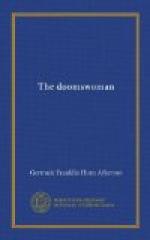VIII.
Monterey danced every night and all night of that week, either at Alvarado’s or at the Custom-house, and every afternoon met at the races, the bull-fight, a merienda, or to climb the greased pole, catch the greased pig by its tail as it ran, or exhibit skill in horsemanship. Chonita, at times an imperious coquette, at others, indifferent, perverse, or coy, was La Favorita without appeal, and the girls alternately worshipped her—she was abstractedly kind to them—or heartily wished her back in Santa Barbara. Estenega rarely attended the socialities, being closeted with Alvarado and Castro most of the time, and when he did she avoided him if she could. The pirates had fled and were seen no more; but their abrupt retreat, as described by Chonita, continued to be an exciting topic of discussion. There were few of us who did not openly or secretly approve of Estenega’s Jesuitism and admire the nimbleness of his mind. The clergy did not express itself.
On the last night of the festivities, when the women, weary with the unusually late hours of the past week, had left the ball-room early and sought their beds, and the men, being at loss for other amusement, had gone in a body to a saloon, there to drink and gamble and set fire to each other’s curls and trouser-seats, the Departmental Junta met in secret session. The night was warm, the plaza deserted; all who were not in the saloon at the other end of the town were asleep; and after the preliminary words in Alvarado’s office the Junta picked up their chairs and went forth to hold conclave where bulls and bears had fought and the large indulgent moon gave clearer light than adamantine candles. They drew close together, and, after rolling the cigarito, solemnly regarded the sky for a few moments without speaking. Their purpose was a grave one. They met to try Pio Pico for contempt of government and annoying insistence in behalf of his pet project to remove the capital from Monterey to Los Angeles; Jose Antonio Carillo and Reinaldo Iturbi y Moncada for conspiracy; and General Vallejo for evil disposition and unwarrantable comments upon the policy of the administration. None of the offenders was present.
With the exception of Alvarado, Castro, and Estenega, the members of the Junta were men of middle age, and represented the talent of California,—Jimeno, Gonzales, Arguello, Requena, Del Valle. Their dark, bearded faces, upturned to the stars, made a striking set of profiles, but the effect was marred by the silk handkerchiefs they had tied about their heads.
Alvarado spoke, finally, and, after presenting the charges in due form, continued:
“The individual enemy to the government is like the fly to the lion; it cannot harm, but it can annoy. We must brush away the fly as a vindication of our dignity, and take precaution that he does not return, even if we have to bend our heads to tie his little legs. I do not purpose to be annoyed by these blistering midgets we are met to consider, nor to have my term of administration spotted with their gall. I leave it to you, my compatriots and friends, to advise me what is best to do.”




